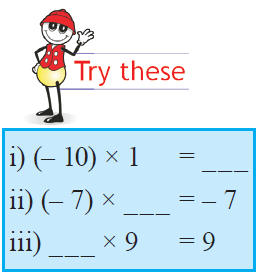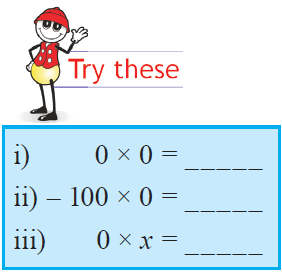PROPERTIES OF MULTIPLICATION
Subscribe to our ▶️ YouTube channel 🔴 for the latest videos, updates, and tips.
A teacher wants to gift $20 cash prize to one of the students for his performance in the class.
In case, if the teacher wants to gift the same cash prize $20 to six students, how much does he have to spend?
To get answer for the above question, we will be writing 20 six times and add them all.
That is,
20 + 20 + 20 + 20 + 20 + 20
Adding 20 six times can be written as (6x20).
Here, the fact what we have to understand is, the result of adding 20 six times is equal to multiplying 6 and 20.
That is,
20 + 20 + 20 + 20 + 20 + 20 = 6 x 20
= 120
Therefore, to gift $20 cash prize to six students, the teacher has to spend $120.
Following are the properties of multiplication :
(i) Commutative property
(iii) Associative property
(iv) Identity property of multiplication
(v) Inverse property of multiplication
(vi) Multiplication by zero
(vi) Distributive property of multiplication
Commutative Property of Multiplication
Observe the following :
5 x (–6) = –30 and (–6) x 5 = –30
Therefore,
5 x (– 6) = (– 6) x 5
Therefore, multiplication is commutative for all real numbers.
In general, for any two real numbers a and b,
a x b = b x a

Associative Property of Multiplication
Consider the real numbers 2, 5, 7.
Look at
2 x (5 x 7) = 2 x 35 = 70
(2 x 5) x 7 = 10 x 7 = 70
Thus
2 x (5 x 7) = (2 x 5) x 7
So we can say that real numbers are associative under multiplication.
In general, for any real numbers a, b and c,
a x (b x c) = (a x b) x c
Identity Property of Multiplication
Observe the following :
5 x 1 = 5
1 x (-7) = -7
This shows that ‘1’ is the multiplicative identity for real numbers.
In general, for any real number 'a' we have
a x 1 = 1 x a = a

Inverse Property of Multiplication
For any real number, say 'a', the multiplicative inverse is its reciprocal.
That is, multiplicative inverse of 'a' is 1/a.
For example,
The multiplicative inverse of 5 is 1/5
The multiplicative inverse of 3 is 1/3
Note :
Multiplication of a number and its multiplicative inverse is always 1.
That is,
5 x 1/5 = 1
Zero Property of Multiplication
The product of any nonzero real number and zero is zero.
Observe the following :
5 x 0 = 0
–8 x 0 = 0
In general, for any nonzero real number 'a',
a x 0 = 0 x a = 0

Distributive Property of Multiplication
Distributive Property of Multiplication Over Addition :
Consider the real numbers 12, 9, 7.
Look at
12 x (9 + 7) = 12 x 16
= 192
12 x (9 + 7) = 12 x 9 + 12 x 7
= 108 + 84
= 192
Thus
12 x (9 + 7) = (12 x 9) + (12 x 7)
In general, for any real numbers a, b and c.
a x (b + c) = (a x b) + (a x c)
Therefore, multiplication is distributive over addition.
Distributive Property of Multiplication Over Subtraction :
Consider the real numbers 12, 9, 7.
Look at
12 x (9 - 7) = 12 x 2 = 24
12 x (9 - 7) = 12 x 9 - 12 x 7
= 108 - 84
= 24
Thus
12 x (9 - 7) = (12 x 9) - (12 x 7)
In general, for any real numbers a, b and c.
a x (b - c) = (a x b) - (a x c)
Therefore, multiplication is distributive over subtraction.
Multiplication Property of Equality
Two sides of an equation remain equal, if both sides are multiplied by the same non zero number.
That is, if a = b, then
k x a = k x b
Example :
5 = 5
Multiply both sides by 2.
2 x 5 = 2 x 5
10 = 10
Questions and Answers
Question 1 :
Given an example for Commutative Property of Multiplication.
Answer :
7 x 9 = 9 x 7
Question 2 :
Given an example for Associative Property of Multiplication.
Answer :
2 x (3 x 5) = (2 x 3) x 5
Question 3 :
Given an example for Identity Property of Multiplication.
Answer :
5 x 1 = 1 x 5 = 5
Question 4 :
Given an example for Identity Property of Multiplication.
Answer :
9 x 0 = 0 x 9 = 0
Question 5 :
Find the product of 1 and 12.35.
Answer :
According Identity Property of Multiplication, the product of 1 and any number is always equal to the number itself.
So,
1 x 12.35 = 12.35
Question 6 :
Find the product of 7.58 and 0.
Answer :
According Zero Property of Multiplication, the product of any number and zero is always equal to zero.
So,
7.58 x 0 = 0
Question 7 :
Evaluate the following multiplication using Distributive Property of Multiplication.
2.5(4 + 8)
Answer :
2.5(4 + 8) = 2.5 x 4 + 2.5 x 8
= 10 + 20
= 30
Subscribe to our ▶️ YouTube channel 🔴 for the latest videos, updates, and tips.
Kindly mail your feedback to v4formath@gmail.com
We always appreciate your feedback.
About Us | Contact Us | Privacy Policy
©All rights reserved. onlinemath4all.com

Recent Articles
-
US Common Core K-12 Curricum Algebra Solving Simple Equations
Jan 07, 26 01:53 PM
US Common Core K-12 Curricum Algebra Solving Simple Equations -
10 Hard SAT Math Questions (Part - 4)
Jan 05, 26 06:56 PM
10 Hard SAT Math Questions (Part - 4) -
10 Hard SAT Math Questions (Part - 3)
Jan 05, 26 06:34 PM
10 Hard SAT Math Questions (Part - 3)

